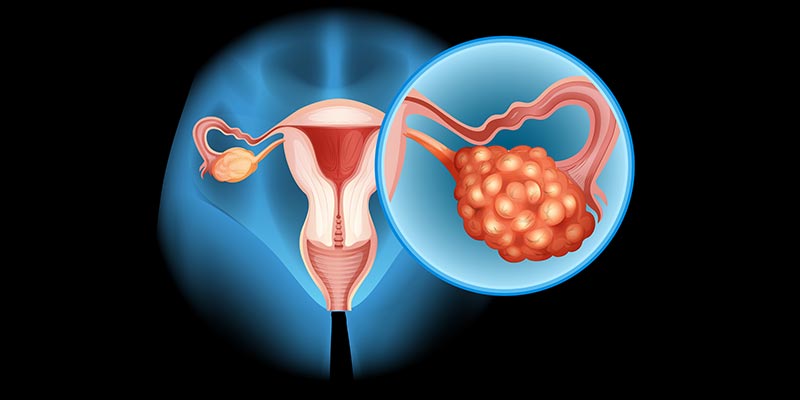Polycystic Ovarian Syndrome (PCOS) is a complex hormonal disorder which affects women of reproductive age worldwide. Our Consultant Gynaecologist at Rapid Access Gynaecology is dedicated to offering expert care and support to those women dealing with this condition, utilizing the latest research and treatment methods to improve health outcomes.
Introduction to PCOS (Polycystic Ovarian Syndrome)
PCOS is more than just a reproductive disorder; it’s a multisystemic condition that can influence many aspects of a woman’s health and well-being. It’s characterized by a combination of symptoms and signs that reflect a hormonal imbalance (high testosterone levels), impacting not only fertility, metabolic health (the risk of Diabetes Mellitus), skin problems (acne and hirsutism),and even some mental health. Understanding PCOS is the first step toward empowering effective care, management and treatment.
What is PCOS?
At its core, PCOS is defined as an overproduction of androgens (male hormones) in women, leading to a spectrum of symptoms that can vary widely among women. These symptoms include irregular and sparse menstrual cycles, polycystic ovaries (as detected by ultrasound, with numerous small cysts on the ovaries), and signs of androgen sensitivity and excess (acne, excessive hair growth, and scalp hair thinning). The characteristic Insulin resistance associated in women with a raised Body Mass Index is also a common problem. PCOS women are therefore at risk of developing type 2 Diabetes.

At What Age Can PCOS Occur?
PCOS will start after puberty, and becomes symptomatic between after the age of 18. Many women discover they have PCOS in their 20s and 30s when they face difficulties ovulating and becoming pregnant and then seek help. However, the signs of PCOS, such as irregular menstrual cycles and acne, can start as early as adolescence, and be treated.
What is the Chance of Developing PCOS and Who Usually Gets It?
The prevalence of PCOS varies, but it is thought to affect about 5% of women of reproductive age, making it one of the most common hormonal disorders among women in this age group. The risk factors for developing PCOS include genetic predisposition-women with a mother or sister with PCOS are at higher risk, a family history of Diabetes, -as well as obesity. PCOS can affect women of all body types.
What are the Stages of PCOS?
PCOS is a heterogeneous condition, and while there aren’t universally accepted “stages” in the progression of PCOS, the condition can manifest in various ways and severities over a woman’s lifetime. It can range from mild symptoms with few to no cysts on the ovaries and minimal androgen excess, to severe manifestations including significant insulin resistance, numerous ovarian cysts, and pronounced symptoms of androgen excess. The condition’s impact can also evolve with age, weight changes, and lifestyle modifications.
Does PCOS impact chances of pregnancy?
PCOS will significantly impact fertility due to hormonal imbalances which prevent ovulation. Women with PCOS will have irregular or sparse menstrual cycles or even complete absence of menstruation. These symptoms of infrequent periods, can be challenging for women to conceive naturally. The high levels of androgens (male hormones), which are characteristic of PCOS can also affect the development and release of eggs from the ovaries. Additionally, PCOS is associated with insulin resistance, which can further disrupt hormonal balance and ovulation.
How is PCOS Treated?
Treatment for Polycystic Ovary Syndrome (PCOS) is multifaceted, addressing both the immediate symptoms and the long-term health risks associated with the condition. The treatment approach should be tailored to each woman’s unique needs, considering her symptoms, health goals, and whether she wishes to conceive. For example at rapidaccess gynaecology, our specialists will use both medical treatment, weight loss management and sometimes surgery to help with ovulation.
What are the current PCOS Treatment Strategies?
Lifestyle changes are often the first line of treatment for PCOS. This can include:
- Dietary Adjustments:A balanced diet rich in fruits, vegetables, lean proteins, and whole grains can help manage weight and reduce insulin resistance. For some women, specifically those with insulin resistance, a low-glycemic index (GI) diet may be beneficial. Breakfast is essential!.
- Physical Activity: Regular exercise will help lower blood sugar levels, improve insulin sensitivity, and can aid in weight loss. Even a modest reduction in body weight (e.g., 5-10% of body weight) can improve symptoms, regulate menstrual cycles, and therefore enhance fertility.
- Weight Management: For overweight women, weight loss is one of the most effective ways to improve the symptoms of PCOS, including improving ovulation and the likelihood of pregnancy. At rapidaccess Gynaecology, we can prescribe a weight loss programme, and work with dieticians and endocrinologists to help our patients.
Medications can be used to treat various symptoms of PCOS:
Hormonal Contraception. The combined oral contraceptive will not only regulate menstrual cycles, but reduce acne and excess hair growth, and protect against a loss of ovarian reserve, and protect against endometrial cancer.
- Metformin: Originally used to treat type 2 diabetes, metformin will help reduce insulin resistance and has been shown to restore ovulation in some women with PCOS. It also can aid weight loss.
- Anti-Androgens: Medications such as spironolactone will reduce excessive hair growth and acne.
- Ovulation Induction: For women who want to conceive: clomiphene citrate (Clomid) or letrozole (Femara) can stimulate ovulation. In some cases, gonadotropins may be used. Our Gynaecologists are specialists in ovulation induction.
- Ovarian Drilling: this surgical technique has been effective in reversing the effects of PCOS and improve ovulation and fertility.
Assisted Reproductive Technologies (ART)
In cases where the standard medical treatments are unsuccessful assisted reproductive technologies such as in vitro fertilization (IVF) may be recommended to help women with PCOS conceive.
What is PCOS Surgery?
Surgery for PCOS can also be considered, particularly for women struggling with infertility due to PCOS. Ovarian drilling, is a laparoscopic procedure where our surgeon will use laparoscopy to view your pelvis and make a series of small burns on each ovary. This results in a reduction in the production of androgens, and also improves ovulation.
At Rapid Access Gynaecology, we are committed to providing compassionate, expert care for women who suffer from PCOS. Our approach combines the latest medical treatments with lifestyle modification support to address the full spectrum of PCOS symptoms and related conditions. Understanding that PCOS affects every woman differently, our specialists work closely with each patient to develop a tailored treatment plan that addresses her unique needs and health goals. Please get in touch with our friendly team for further advice, we also undergo other specialist gynaecology procedures, from Vaginal Tightening in London, to Mona Lisa Touch, to Endometriosis testing.




